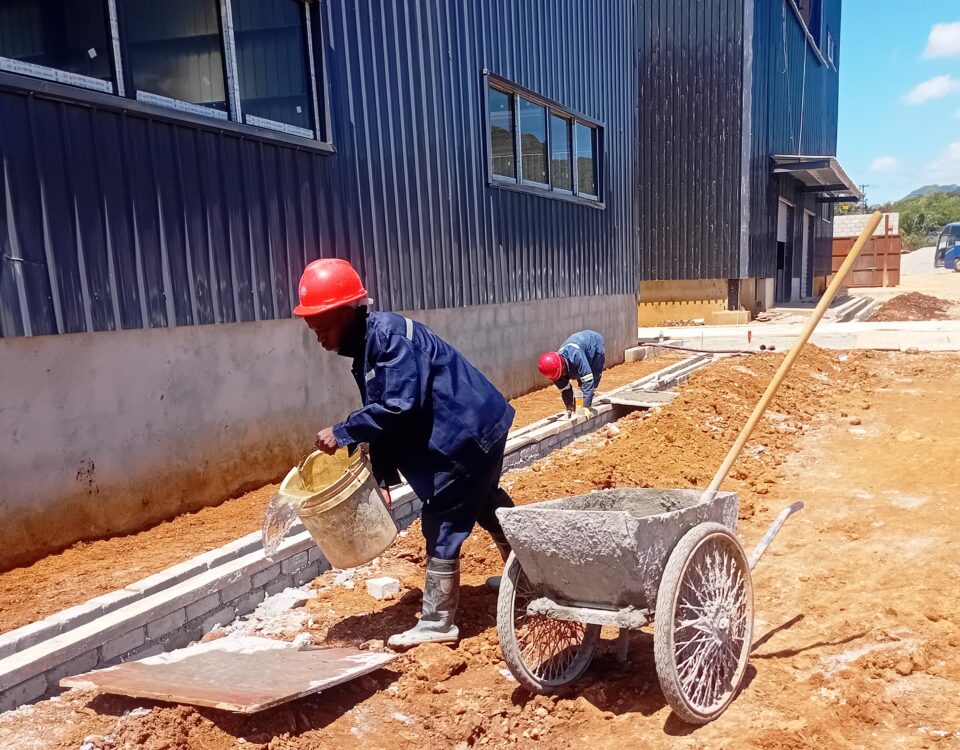
Zimbabwe’s affluent businessman Chivhayo impersonated in Facebook scams demanding money, promising US$20 000 to duped fans.
June 30, 2025
The rise of Shadaya the ‘Iron lady’ of gold mining in Manicaland
July 19, 2025Mutare public transport mogul Mupfumi receives ZNCC Lifetime Achievement Award and opens up on his illustrious business career
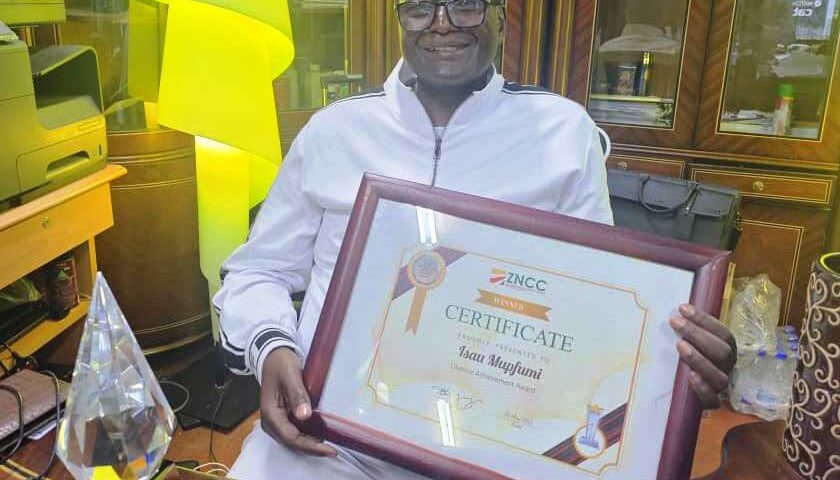
Dr Isau Mupfumi shows of his Lifetime Achievement Award that he received at the prestigious 2025 Zimbabwe National Chamber of Commerce (ZNCC) Manicaland business awards.
Ngoni Dapira
IT’s everyone’s dream to leave a great legacy behind. For some people they are born in greatness, whilst some have to achieve greatness. Last week Friday the Zimbabwe National Chamber of Commerce (ZNCC) Manicaland chapter awarded Mutare based public transport mogul Dr Isau Mupfumi, the Lifetime Achievement Award, during the prestigious, regional annual business awards held in Mutare at a local hotel.
Beyond doubt Dr Mupfumi, who was in 2016 conferred with an Honorary Doctorate of Humane Letters Degrees by the United Kingdom based International Institute of Philanthropy, had to achieve his greatness and his story inspires those with big dreams that anything is possible if you put your mind to it, even if you come from a poor background. In the eastern border city of Mutare, to try paint a picture of how popular he is, if you ask out a 100 people if they know the surname ‘Mupfumi’ it is most likely that only about 10 out of a 100 might say they do not know him, which explains the extent of his popularity as an astute businessman cum politician.

Dr Mupfumi shows off some of his other business awards he has received in the past.
The Lifetime Achievement award which is given to distinguished businesspeople that have left an indomitable mark in their prolific business careers was introduced in 2017 with real estate business magnate Joseph Sanhanga as the first recipient at the regional awards. Over the years many illustrious businesspeople from Manicaland, the likes of the late Hlanganiso Matangaidze, a hotelier and haulage transport entrepreneur, the late Johanne Masowe Apostolic Church High Priest Noah Taguta, Stephen Mutsongodza an eduprenuer and transporter, Sue Peters a former supermodel cum real estate businesswoman and hotelier, among others, have received this highly venerated award.
On Tuesday, Easterntimeszim interviewed the 63 year old businessman cum politician to find out about his journey in business since 1985 when he ventured into business and how he became a household name not only in Manicaland but throughout Zimbabwe as well and regionally where he also did some business. Mupfumi operates his company as Chinjekure Enterprises with various entities including real estate properties and farming projects, but his main trading franchise is the public transport franchise, Mupfumi Buses, which is what made him the prominent businessman he is today.
Born in 1962 in Chivhu, Mupfumi said their clan name is Chinjekure but as was done traditionally back then their family used their grandfather’s first name as their surname, which is why years on, he decided to use the clan name, Chinjekure. as the company name to honour his forefathers.
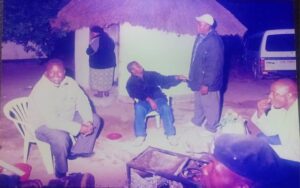
Dr Mupfumi (sitting with white jacket) enjoying with colleagues at his rural home where he would organise live shows to celebrate with his rural community in Chivhu.
Mupfumi like most businesspeople his age that grew up in the colonial Southern Rhodesia, he started from humble beginnings. Born in a family of 10 siblings, fate however had something great set for him as he was the only one that eventually ventured into business despite having started his career as a law enforcement officer just after independence in 1980.
“I was a mujibha (a male war collaborator who assisted freedom fighters) during the liberation war so after independence I was called up for a job as a law enforcement officer. I was actually amongst the police officers that were tasked to guard Britain’s Prince Charles when he came to Zimbabwe in 1980 for the Independence Day commemorations,” said Mupfumi as he went down memory lane.
In the independent Zimbabwe, Mupfumi said the greater part of his career as a police officer was in the traffic section, which is where he learnt a lot about the gaps in the public transport system and developed an interest in being a public transporter.
“I followed closely the deregulation and liberalisation process of the transport sector which ended ZUPCO’s monopoly. Every day I would think hard about how I could step up as an indigenous person without any money and run my own transport company,” said Mupfumi.
After Zimbabwe’s independence, the government implemented policies that opened up the transport sector to private participation, including ending ZUPCO’s monopoly on urban public transport. This move aimed to address increasing demand, competition and budgetary constraints related to state-owned transport services.
The deregulation and liberalisation of the sector facilitated the entry of private entrepreneurs, particularly indigenous ones, into the market. This change was part of a broader economic reform program, ZIMPREST that emphasized deregulation and private sector involvement.
“I remember that decisive day in the early 1980s, when I decided to go and inquire about loans at Barclays Bank. I was still very young in my late 20’s that time. The manager was on lunch break, but I was able to talk with him and shared my vision as an indigenous person that wanted to take advantage of the opportunities of deregulation in the public transport sector. I really thank the late Sydney Mundangepfupfu who was back then the manager at Barclays Bank and his assistant manager Vincent Musorosekwa who helped me with information and advice on how best I could get financing using the deregulation gap. They told me my best hope of getting financing was through Scotfin Ltd. However, at Scotfin Ltd they wanted collateral and I had to think of a plan on how to get collateral,” said Mupfumi.
Mupfumi said as a well-known police officer back then he knew some well-established businesspeople so he engaged one businessman, John Mazara, who had just bought a garage in the Pualington light industrial area in 1992. Mazara had faith in his business idea of purchasing a mini bus and agreed to cede his garage to be used as collateral at Scotfin Ltd.
“I remember it was a $40 000 Zimbabwean dollars deposit and I bought my first brand new mini bus, a Ford Spectron. By that time Africa University (AU) had just opened in 1992 and I entered into an agreement with them to hire my mini bus for their various activities. Business was going well but I realized I needed more buses. I approached SEDCO (Small Enterprises Development Corporation) now SMEDCO and pitched my business idea and they financed me two more mini-buses, so I now had three mini-buses. I mostly rented them out to AU again,” he said.
He said business was booming and he was gaining confidence in venturing more into the public transport business but he was still employed as a police officer then. He wanted more mini-buses but bigger ones which were being manufactured locally at Deven Engineering, the T35 mini buses, so he approached UDC Holdings, a financial service, which agreed to loan him money for seven more buses.
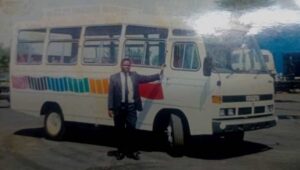
Dr Mupfumi with his first Isuzu mini bus that he went to buy in Kenya in Nairobi.
“UDC Holdings was mostly for Indians but they believed in my vision. With 10 buses now, business was well and I was becoming a reputable public transporter to the extent that Scotfin Ltd decided to engage me after realizing they were losing a potentially big client. The manager then at Scotfin Ltd, Timothy Mumvenge gave me another loan. I was able to buy 10 more buses in batches and that is when I took all the urban routes in Mutare and went out to several districts throughout Manicaland province. That is the period when I also bought my first fleet of Isuzu mini buses in Kenya in Nairobi and it was my first time to board a plane in my life,” said Mupfumi as he laughed.
As business grew he purchased his first commercial property, which was an electrical workshop, Simz Electrical, and it became Mupfumi Buses garage, situated in the central business district in Mutare in B Avenue. Scotfin Ltd continued to work with him, but urged him to venture into coach buses for long routes.
Mupfumi added that throughout all that time he was still a police officer. However, as a traffic police officer, according to the police service charter then, one was not allowed to venture into the transport business, so his wife Roseline, who was teacher at Munyarari Primary School in Zimunya, was the one who was in charge of the business operations.
“Around early 2000, after I was constantly being put up for transfers to leave Manicaland province, I decided to resign. I had planned to retire after 20 years but after serving 19 years and six months, I was transferred to Gokwe and that is when I decided to resign and focus on the business.”
He said after resigning from law enforcement, the aim was to grow his business empire which he did as he ventured more into luxury coach buses like the Marcopolo for both local and inter-city routes. As the business empire grew he ventured into buying properties as investment, farming tobacco and maize at his Nyazura farm and later ventured into entertainment.
In 2010 Mupfumi said he bought Senatar buses, a franchise that was owned by Andre Zietsman, in a $3million (Zimbabwe dollars) deal which included buses, trucks and a garage. The deal further increased his fleet of buses and years later he also bought the Gold Class buses franchise.
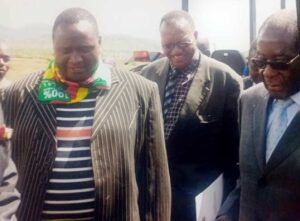
Dr Mupfumi with the late former President Robert Mugabe (extreme right) at a function in Mutare.
Speaking on his political career in Zanu-PF, he said it started after he had left the police early 2000. He said he was approached by the late former Defense Minister who was also once the Makoni West legislator, Moven Mahachi and Oppah Muchinguri-Kashiri who proposed that he becomes the next Zanu-PF Manicaland secretary for transport. At that point he said he now had a fleet of over 200 buses at his garage which is why probably he was noticed. He agreed and from there he worked his way up the political ladder running as the Zanu-PF candidate for Dangamvura / Chikanga constituency then changed recently to contest in Mutare Central constituency in the 2023 elections.
He has been a Zanu-PF Central committee member, the principal organ of the ruling party, for the past 20 years and said he continues to serve the party diligently. Mupfumi said for many years from the early 2000’s he was also the Manicaland president of the Affirmative Action Group (AAG), which was very vocal on black empowerment enterprises after independence, which is where he horned his political skills and passion to create more opportunities for indigenous entrepreneurs like him that had nothing but were hungry to make it in business.
“I helped so many people over the years including very senior politicians. The current resident Minister (Hon Misheck Mugadza) was and remains my friend as we go way back. I helped him start his law firm back then amongst other projects and we traveled a lot together, so I am happy to see him rise now in politics as well. Over the years I am happy to see a lot of people I helped grow in their various careers and business ventures. The likes of Dr Leonard Mukumba of Inter Africa, I am happy he received the Businessman of the Year award this year. I remember many years back when he was working for some company and he had supplied me with a bus, so I gave him $20 as thank you, which he was very grateful for. That was then, but now he is top businessman. That is the beauty of life,” said Mupfumi as he laughed.
Mupfumi who also ventured into entertainment in 2009, hosting shows at Pick and Save Leisure Centre which was later rebranded to be called the Platinum Lounge Bar, which is situated at his first garage in the CBD, said entertainment later became a business model, but when he started, it was his philanthropic arm to help musicians and develop the arts sector.
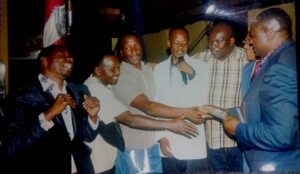
Dr Mupfumi gifting musicians and music promoters at Pick and Save back in the days.
“I would use Pick and Save to support local musicians. The likes of the late Tongai Moyo who was the first to perform there, I personally gave him a mini bus and bought musical instruments to help him on his tours. The likes of Jah Prayzah I bought him his first Mercedes Benz before his rise to stardom and that’s when he sang ‘Tsviriyo’ praising me, so I gifted many other artists like gospel musician Fungisai Zvakavapano Mashavave, Alick Macheso, to mention a few. So what Wicknell Chivhayo is doing now, I was first to start gifting artists, which is a good thing when you are passionate about helping to improve the welfare of local musicians and people in general,” he said.
On advice about how to stay afloat in business, Mupfumi said when one reaches 55 years with over 20 years in business, one must continue with what they know best and not experiment by diversifying.
“Running a business is not DNA related. A lot of businesses crumbled after parents left the business in the hands of siblings when they were still alive, thinking the children can do better. Children should be groomed about the business and inherit after they are gone,” said Mupfumi.
Adding, “I worked hard to get where I am and took a lot of risks but I am glad it has paid off to the extent of receiving this Lifetime Achievement award. I was also helped by some local businesspeople to step up the likes of Mazara that I mentioned. In Manicaland, myself and Tenda we are the last old players in the public transport business but we were many. This tells a lot about how hard the transport business is. So it takes a lot of discipline and endurance as we survived a lot of economic shocks over the years.”
Mupfumi said with his wife Roseline, they have raised their four children who are all university graduates and working outside the country in their respective careers.


